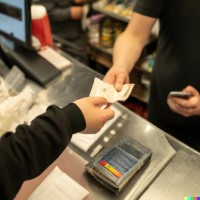Check Forgery

Check forgery involves the unauthorized alteration or creation of a check with the intent to deceive and obtain funds illegally. Perpetrators may alter the payee's name, the amount of money, or other crucial details to divert funds to themselves or others.
Criminals steal paper checks sent through the mail, for example, by fishing them from USPS mailboxes or by taking them out of your personal mailbox. See Mail Theft. Once they have a check you wrote and mailed, for example, to a charity, they use chemicals to “wash” the check in order to change the amount or make themselves the payee. They then deposit your check and steal money from your account.
If your financial institution has reimbursed your financial loss (or will remove the fraudulent charges from your account), they become the monetary victim and must reach out to law enforcement for further assistance.
Signs of Check Forgery
- Altered Signatures: Check signatures that appear inconsistent, shaky, or different from previous signatures that could indicate forgery.
- Tampered Checks: Look for signs of erasures, alterations, or changes in handwriting, which may suggest unauthorized modifications.
- Mismatched Information: Discrepancies between the written and numerical amounts, altered payee names, or unfamiliar details should raise suspicion.
- Unusual Bank Activity: Unexpected withdrawals, debits, or discrepancies in account balances may signal fraudulent check activity.
- Unknown Payees: Checks payable to unfamiliar individuals or entities without valid explanations may indicate fraudulent activity.
- Missing payments: If you have mailed a check that was paid, but the recipient never received it, you may be a check-washing victim. See Mail Theft.
- Advanced Fee: If someone you don’t know sends you a check and asks for money back, it is likely to be a scam. See Advanced Fee for how that works.
Prevention Tips
- Secure Checks: Store blank checks in a secure location and monitor their usage regularly.
- Use Security Features: Employ checks with built-in security features such as watermarks, microprinting, and chemical-sensitive paper.
- Review Statements: Routinely review bank statements for any unauthorized transactions or discrepancies. Report suspicious activity to the bank immediately.
- Avoid Sharing Sensitive Information: Never share sensitive financial information, such as debit card details and PINs, in response to unsolicited messages or offers.
-
Organizations and businesses should:
- Train employees to recognize signs of check forgery and encourage them to report any suspicious activity.
- Require dual authorization for large transactions and sensitive check-related activities.
-
The US Postal Service recommends that you:
- Drop off mail in blue collection boxes before the last scheduled pick-up time or directly at your local Post Office.
- Regularly check your mail. Do not leave your mail in your mailbox overnight.
- If you’re heading out of town, have the Post Office hold your mail or ask a trusted friend or neighbor to pick up your mail.
Recovering from this scam
- Report to Bank: Immediately report suspected check forgery to your bank or financial institution to freeze the account and prevent further losses.
- File a Police Report: If necessary, file a police report to document the fraud. This report may be required by the bank or relevant authorities during the investigation. For Montgomery County residents, call 301-279-8000 (the non-emergency number) to report this crime.
- Provide Documentation: Provide copies of forged checks, bank statements, and any other relevant documentation to authorities and your bank.
- Cooperate with Investigations: Cooperate with bank investigations and law enforcement agencies to identify the perpetrator and recover lost funds.
- Monitor Accounts: Continuously monitor your accounts for any additional unauthorized activity and follow up with your bank regarding any concerns.
References:
- Kunjukunju, S. American Bankers Association. (2024 March 19). Check Washing and Check Theft Scams. Retrieved from https://www.aba.com/news-research/analysis-guides/check-washing-and-check-theft-scams.
- Federal Trade Commission. (2020). FTC: The bottom-line on fake checks scams | Consumer Advice. Retrieved from https://consumer.ftc.gov/consumer-alerts/2020/02/ftc-bottom-line-fake-checks-scams
- Federal Trade Commission. (2022). How To Spot, Avoid, and Report Fake Check Scams | Consumer Advice (ftc.gov). Retrieved from https://consumer.ftc.gov/articles/how-spot-avoid-report-fake-check-scams.

